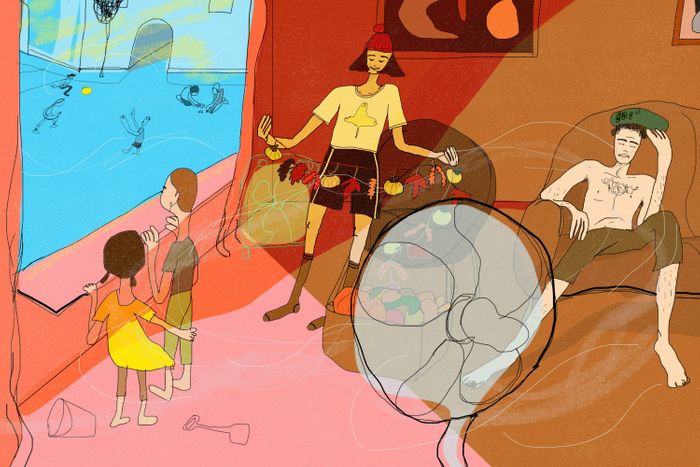
In premedieval Europe, households would celebrate the arrival of summer around the solstice by festooning their doorways and barn roofs with young tree boughs and sprays of spring flowers and herbs. Midsummer was the most important celebration of the year alongside Christmas. It was a time when people ate outdoors, swam naked, lit giant bonfires with their neighbors, and experienced pleasures of the flesh by the light of the sun.
I was reminded of midsummer festivals the other day as I scrolled past an Instagram reel in which the momfluencer Macy Blackwell demonstrates the elaborate fall decorations she had set up around her front door. I’d been noticing the fall decorations seeping into my feed as early as August 8. Macy, it turns out, set out her first fall decorations July 16. Who can blame her? Every human in the Northern Hemisphere is begging to wake up to a crisp morning at this point.
I’ve been watching the popular fetishizing of fall for the past few years, and this year feels different. About six weeks into summer, I saw my first tutorial for making my own “pumpkin vase” by cutting the top off a white plastic pumpkin (the white-pumpkin trend does trouble me) and shoving a bunch of faux fronds into the cavity. I wonder about the wildlife management that goes into some of the large-scale gourd displays. Where I live, squirrels eat your jack-o’-lantern by dawn on November 1. I can only assume that serious decorators swap out rotting and half-eaten gourds as the weeks of August, September, and October progress.
There’s a playfulness to all of this, of course, and I respect anyone who decorates, but there is something going on beyond “Fall vibes are cute.” Harvest festivals aren’t new. We have always loved a pumpkin patch on this continent. But we are now celebrating fall when summer isn’t half over. Very few of us have any relationship to “harvest” as either an activity or an economic reality. One day, the pumpkins arrive at Whole Foods.
Last year, I wrote an essay asking if “cozy season” is a cry for help by an anxious populace desperate to control their immediate environments with candles and snuggly socks at the expense of real and unpredictable human connection. While I stand by this theory, I have come to suspect there’s more to it. This year, I’ve noticed a new undercurrent of desperation, an almost pagan yearning for a change of season. It feels preindustrial, as if people are going to start lighting bonfires in their cul-de-sacs to cleanse the air of humidity and evil spirits.
Summer is hell now.
Festivals reflect the times we live in, and the times we are living in are hot. Midsummer used to bring relief from the long winter, and now it is a harbinger of dread: droughts, deadly heat waves, then floods. There has never been an autumn on planet Earth as hotly anticipated as this one, and like the peasants of yesteryear, we are adorning our thresholds, only now it’s with talismans of sanity-restoring cold fronts.
If climate change hasn’t already killed the fantasy of summer, it will soon. The boys of summer are gone fighting wildfires now. It’s been years since the nails went into the coffin of the 1980s dream of a childhood summer at loose ends. Summer is the season of paying for expensive summer camp, thigh chafe, and the struggle to find a sunscreen that doesn’t leave a white cast.
If you enjoy a summer of sun-kissed sea breezes and the sound of kids’ laughter coming from a blessed distance, congratulations, you’re one of the global climate elite. Most people are sweating it out at the public pool or at the local lake stagnating at the temperature of bathwater. If you’re shaking your head at me, thinking about the wonderful lake days you had this summer, I’ll say it again: Enjoy your good fortune, and get ready to share your favorite lake with a whole bunch more bodies — and soon.
Seasons of caregiving
Even warm lake water will rinse the popsicle juice off a recalcitrant child, and for that we are grateful. Unassisted child care for weeks on end is another reason those who are most often responsible for festooning the doorway with seasonal fronds (moms) might be going extra hard on fall this year.
Hayley DeRoche runs the hilarious Sad Beige Instagram page, and she shared a theory with me about moms’ love of fall: Women take on an unequal amount of parenting labor in the summer. “They want to look forward openly to balance being restored and kids being back in school, but it’s not always a sentiment you can express without being told like, WHY DON’T YOU LOVE YOUR KIDS CHERISH EVERY MOMENT YOU ONLY GET 18 SUMMERS MAMA. So fall is a placeholder for the larger thing.”
Summer is not only hell because the earth burns for its duration, then, but because it’s the season most punishing to the nuclear family: You’re supposed to make wall-to-wall magic memories with no affordable camp while melting in front of a whining AC unit. Most communities don’t condone letting kids run around unsupervised all summer, and most parents wouldn’t feel safe letting their kids outside alone anyway. Under extreme heat, summer feels less like a season of expansiveness and more like a season of confinement.
North America doesn’t really walk the walk when it comes to summer, anyway. Until we become a place where things actually shut down and people truly vacate, I’m not sure we can claim to be observing a summer. People just carry on working for the most part. One of my favorite films is Mid-August Lunch (Pranzo di Ferragosto) from 2008, in which a broke guy living with his mother in Rome ends up looking after a group of elderly women while their families leave the city for the August holiday. (This film is a must-watch for anyone currently caring for their older relatives.) The twin premises of this film hint at a reality we can only dream of: There’s a universal holiday during which everyone leaves town, and during this holiday, there are people who require care.
Do societies have seasons?
The second half of 20th-century popular culture was summer flavored. From Gidget to Baywatch to the Beach Boys to all those movies about baseball, the “freedom” of summer has always fit neatly with the American fantasy of possibility and optimism. What if we are undergoing a shift? What if being organized and self-contained — fall vibes — is becoming a more appealing fantasy than being expansive and unpredictable? What if the decorative gourds, pumpkin-spice candles, and fake autumn-leaf garlands aren’t just cute seasonal touches but attempts at conjuring a less chaotic reality? Fall is order, routine, predictability. At the end of one of our hectic summers of ad hoc caregiving and catastrophic weather, we crave quiet and cool the way medieval peasants craved fresh vegetables. It’s not just about the décor. It’s a matter of survival.
I think fall better suits the fantasy world of our age, and this truth is emerging organically through the aggressive fall decorations you’re seeing earlier and earlier in the year. “It’s Decorative Gourd Season, Motherfuckers” was a prophecy of the passionate embrace of fall that was yet to come. Think about it: More of us are sedentary in our work than at any other point in history. Fall’s association with back-to-school casts workaday desk work in the soft light of nostalgia. It makes the stuff we do all year feel virtuous and necessary.
Precarious labor is the reality of more people every year despite the grassroots union drives happening all over the country. Can a precarious labor force really experience the liberation of “summer” as it’s represented in pop culture? Summer is sexual and physical release, chaos, unpredictability. I can understand how (in the 1950s, for example) there was a pent-up need on a widespread social level for a pressure valve to be unscrewed during the warmer months. The relentless discipline of manufacturing work and homemaking, the repression of a segregated, heteronormative society — these conditions begged for people to rip off their clothes and run into the ocean.
But today? I wonder if a lot of people just want some peace and quiet. Jobs are not promised to us, physical intimacy is mediated through apps, infrastructures of care are nonexistent. Summer supremacy is doomed from a climate perspective. For many workers, summer isn’t so much a state of being as a season when the special Starbucks beverages are cold instead of hot. And until kids are once again allowed to roam unsupervised, freeing up both children and parents to experience that mythic summer feeling, I give summer another decade of pop-culture supremacy, tops.
I guess I’m okay with fall being our fantasy season now, but I do wonder what we might lose. The fantasy of summer has always been about a feeling of immediacy, of living in the moment. Being so caught up in the joy of a sunny day that you lose yourself in it. These feelings can’t be captured onscreen. Fall is about executing plans, beginning new projects, organizing your life — activities that lend themselves quite well to digital documentation. Crafting social-media content is a fall-like mind-set. You accomplish a little task with each post, for which you are rewarded. It feels kinda good. But not as good as summer used to feel.





